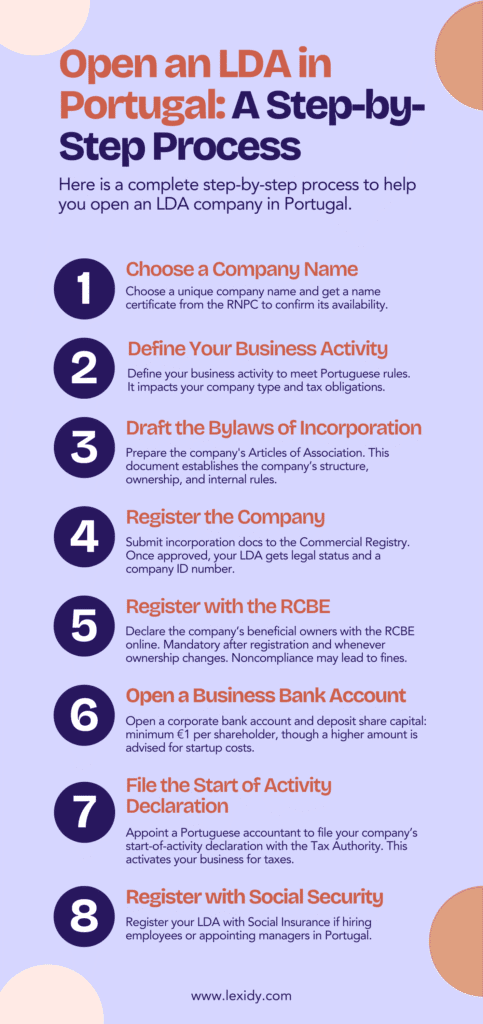Thinking of starting a business in Portugal? The most popular choice for entrepreneurs and investors is the “Sociedade por Quotas” (LDA), Portugal’s version of a Limited Liability Company (LLC). It’s flexible, easy to set up, and offers the legal protection most business owners are looking for.
But where do you start? And how do you avoid the usual red tape?
This guide breaks down everything needed to open an LDA company in Portugal, from legal requirements and share capital to the best ways to get registered quickly and efficiently.
Whether you’re setting up a brand-new venture or expanding an international operation, here’s how to streamline your entry into the Portuguese market.
(Article Updated June 2025)
Table of Contents
- What is an LDA Company Type in Portugal?
- Benefits of an LDA Company in Portugal
- Who Can Open an LDA Company in Portugal?
- Steps to Open an LDA Company in Portugal
- Options for Setting Up an LDA Company
- LDA Company vs Other Business Types
- Legal and Tax Considerations for LDA Companies in Portugal
- Launch Your LDA Company in Portugal with Lexidy
What is an LDA Company Type in Portugal?
A Sociedade por Quotas (LDA) is the most common type of company structure in Portugal, especially for small and medium-sized businesses. It’s the local equivalent of a Limited Liability Company (LLC) and is designed to offer a balance between legal protection and operational flexibility.
An LDA company in Portugal is a legal entity that can be created by one or more shareholders, whether individuals or legal entities. It’s frequently used by entrepreneurs, startups, and foreign investors because it’s simple to set up and adaptable to different business needs.
This structure is often the preferred choice for those looking to establish a presence in Portugal with limited personal risk and a clear legal framework.
Can foreigners open a company in Portugal? Find out the reqiurements and how our lawyers help.
Benefits of an LDA Company in Portugal
Choosing an LDA structure offers a range of advantages for both local and international business owners. Here are the key benefits:
Limited Liability Protection
Shareholders are only liable up to the amount they invest in the company. This means personal assets are shielded from any business debts or obligations.
Low Share Capital Requirements
An LDA can be established with as little as €1 per shareholder. This makes it accessible to entrepreneurs of all sizes, while still offering the full legal protections of a corporate entity.
100% Foreign Ownership Allowed
There are no restrictions on foreign ownership. Non-residents can fully own and manage an LDA, making it one of the most foreign-friendly structures in Portugal.
Flexible Structure
An LDA company in Portugal can have a single shareholder or multiple partners. These can be individuals or legal entities, allowing for a wide range of business models and ownership arrangements.
Simplified Setup and Maintenance
Compared to other corporate structures, LDAs have fewer administrative burdens. The formation process is straightforward, and ongoing obligations like accounting and reporting are relatively simple to manage.
Who Can Open an LDA Company in Portugal?

Portugal makes it easy for both residents and non-residents to open an LDA company. Whether you’re an individual or a business entity, the process is accessible with a few essential requirements.
EU and Non-EU Individuals
Both EU and non-EU citizens can establish an LDA company in Portugal. There are no nationality or residency restrictions. However, all shareholders and directors must have a Portuguese Tax Identification Number (NIF) before proceeding with company formation.
Foreign Companies Opening Subsidiaries
Foreign legal entities can also open an LDA as a subsidiary of their existing business. This provides a way to operate independently in Portugal while still maintaining ties to the parent company. The subsidiary will have its own legal identity and can enter contracts, hire staff, and carry out business activities in Portugal.
NIF and Legal Representation Requirements
If any shareholder or director is not a Portuguese resident, they must appoint a fiscal representative in Portugal. This representative is responsible for managing communication with the Portuguese tax authorities and ensuring compliance with local obligations.
For non-residents, the process typically starts by obtaining a NIF and appointing a legal representative in Portugal. Once that’s in place, the next step is to register the company itself.
Need help opening an LDA company in Portugal? Let our legal team guide you through each step.
Steps to Open an LDA Company in Portugal
Here’s a step-by-step look at how to register an LDA company in Portugal, whether you’re a resident or a foreign founder:

1. Choose and Reserve a Company Name
Create a unique name for your company and obtain a firm certificate from the National Registry of Legal Entities (RNPC) confirming the name’s availability.
2. Define Your Business Activity
Clarify what your company will do and ensure it aligns with Portuguese business regulations. This will influence your company classification and tax obligations.
3. Draft the Bylaws of Incorporation
Prepare the company’s Articles of Association. This document establishes the company’s structure, ownership, and internal rules.
4. Register the Company
Submit the incorporation documents to the Commercial Registry (Registo Comercial da Sociedade). Once approved, your company becomes a legal entity and receives its official company number.
5. Register with the RCBE (Central Register of Beneficial Ownership)
Declare the company’s beneficial owners with the RCBE, which is mandatory for all Portuguese legal entities. This declaration identifies the individuals who ultimately own or control the company.
It must be submitted online after company registration and updated whenever there are changes in ownership or control. Failure to comply may result in fines or limitations on certain corporate actions.
6. Open a Business Bank Account
Set up a corporate bank account in Portugal and deposit the minimum share capital. While the legal minimum is just €1 per shareholder, a higher amount is often recommended to cover startup costs.
7. File the Start of Activity Declaration
Appoint a Portuguese Chartered Accountant to file the declaration of beginning of activity with the Portuguese Tax Authority. This officially activates your company for tax purposes.
8. Register with Social Security
Enroll the LDA company in Portugal with the Social Insurance Service, especially if hiring employees or appointing managers based in Portugal.
Timeline
The full process typically takes anywhere from 2 to 6 weeks, depending on document readiness, appointment availability, and the efficiency of Portuguese authorities.
Options for Setting Up an LDA Company

There are three main ways to register an LDA company in Portugal. The best option depends on your location, timeline, and how much support you need.
| Setup Method | Cost Estimate – Government Fees | Speed | Best For |
| Online | € 250 | 7–10 business days | Non-residents with legal help |
| In-Person/ Urgency | € 560 | Same-day setup | Non-residents or founders in Portugal |
| Traditional | € 250 | 2+ weeks | Complex cases or custom setups |
1. Online Setup
The most practical and cost-effective method. A lawyer submits the application through the Commercial Registry Portal. This option is ideal if you have your documents ready and don’t need to be physically present in Portugal.
- Requires digital signatures or lawyer assistance
- Registry typically responds within 10-20 business days
- Official documents are delivered by mail
2. In-Person Setup
The fastest option, especially for non-residents or those already in Portugal. Company registration can often be completed in just one hour at a government office, such as Empresa na Hora.
- You’ll receive incorporation documents immediately
- Available for unipersonal, multi-member, and public limited companies
- Higher upfront cost due to expedited service fees
3. Traditional Method
This is the slowest and most manual approach to open an LDA company in Portugal. It involves scheduling individual appointments with different government departments and submitting documents in person or by mail.
- Useful in complex or unusual cases
- Takes at least two weeks to complete
- Requires hands-on coordination between steps
LDA Company vs Other Business Types
| Type | Legal Entity | Liability | Capital Needed | Owners | Best For |
| LDA | Yes | Limited | €1 per shareholder | Individuals or Companies | Entrepreneurs, SMEs, foreign investors |
| Sole Proprietorship | No | Unlimited | None | Individuals | Freelancers, solo professionals |
| Subsidiary | Yes | Limited (Local) | €1 per shareholder | Foreign Companies | Long-term foreign operations |
| Branch | No | Limited (Parent) | n/a | Foreign Companies | Short-term or test-market activity |
Common Use-Case Examples
| Scenario | Best Fit | Why |
| A freelancer | Subsidiary offers legal independence; a branch is quicker to launch. | Fast, low-cost setup with minimal paperwork and no partners needed. |
| An entrepreneur starting a one-person agency . | LDA | Allows limited liability, flexible ownership, and foreign investors. |
A tech startup with international investors + a multinational expanding into Portugal. | Subsidiary or Branch | Subsidiary offers legal independence; branch is quicker to launch. |
Legal and Tax Considerations for LDA Companies in Portugal

Opening an LDA in Portugal means committing to specific legal responsibilities and financial obligations. Here’s what founders should be aware of:
Shareholder vs Partner Liability
LDA companies offer limited liability protection.
- Shareholders are only liable for the amount they contribute to the company’s share capital. Their personal assets are not at risk.
- Partners (in the case of contractual obligations within the company statutes) may hold additional responsibilities based on what’s outlined in the Articles of Association.
In general, personal liability does not extend beyond what’s committed to in the company’s formation documents.
Social Security for Managers
Any managing director (gerente) must be registered with the Portuguese Social Security system, even if they are not drawing a salary.
- If a manager is contributing to the social system of another EU country, they may be exempt from Portuguese contributions for up to two years under EU coordination rules.
- For non-EU nationals, contributions in Portugal are generally required unless a bilateral agreement exists.
Tax Registration and Filing
An LDA company must register with the Portuguese Tax Authority (Autoridade Tributária) upon formation. From there, it must:
- File a start of activity declaration
- Maintain organized accounting records
- Submit annual tax returns and VAT filings (if applicable)
- Ensure all invoices and tax documents comply with Portuguese standards
A Chartered Accountant is legally required to oversee tax and accounting compliance from the moment the company becomes active.
Minimum Recommended Capital
Although the legal minimum share capital is €1 per shareholder, it’s highly recommended to begin with at least €5,000 to €25,000, depending on the company’s needs.
This ensures:
- Smoother bank account opening
- Stronger business credibility
- Better coverage of initial operating costs, such as rent, service providers, and insurance
Launch Your LDA Company in Portugal with Lexidy
For foreign entrepreneurs looking to do business in Portugal, the LDA company offers the right balance of flexibility, legal protection, and accessibility. With low capital requirements, full foreign ownership allowed, and a streamlined setup process, it’s one of the most practical ways to launch a business in Europe.
Still, navigating the legal and administrative landscape can be complex, especially if you’re unfamiliar with Portuguese regulations or don’t speak the language. From drafting documents to handling registrations and tax declarations, getting expert legal support helps ensure a smooth and compliant setup.
Ready to launch your company in Portugal with confidence? Our trusted corporate lawyers in Portugal are here to help. Fill out the form below to get started!

